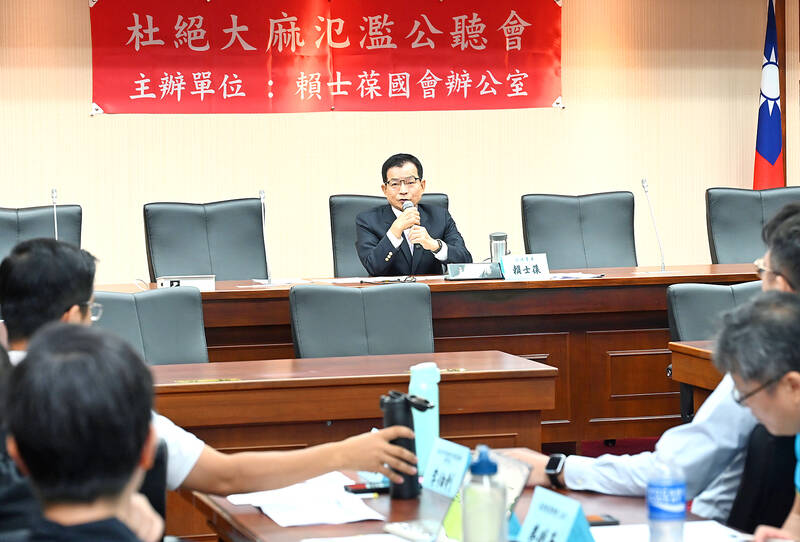Harsher punishments are needed to curb the “rising tide of cannabis flooding into the country,” Chinese Nationalist Party (KMT) Legislator Lai Shyh-bao (賴士葆) told a public hearing yesterday, while advocates said that Taiwan should follow the worldwide trend of legalization.
Lai’s legislative office, with support from church groups and family welfare organizations, held a public hearing at the legislature, where people expressed opposition to all forms of cannabis use, calling it “a gateway drug” and warning of its effects on young people.
Cannabis is a Category 2 narcotic according to the Narcotics Hazard Prevention Act (毒品危害防制條例), but “Taiwan is under assault from its increasing consumption and illegal sale,” Lai said.

Photo: Tien Yu-hua, Taipei Times
More people are using vapes or e-cigarettes, which often contain cannabis extracts, he said.
“Another front is the influx of online sales platforms, which are easily accessible by young people,” he said, adding that transactions are difficult to track down.
Many online forums and influencers are promoting the benefits of cannabis, yet no government agency is cracking down on Web sites that advocate its use, Lai said.
“These are worrying trends,” Christian pastor Chen Shang-jen (陳尚仁) said. “The Internet is full of ‘friendly talk’ on cannabis use, but they are giving incorrect medical information. We should demand corrections or remove them.”
Other speakers cited data showing a surge in cannabis use among young people and said their own surveys showed that more than 90 percent of Taiwanese are opposed to decriminalization of the drug.
However, Green Party member Zoe Lee (李菁琪) and others have called the surveys unreliable, saying that they mainly garner responses from churches and conservative groups.
Taiwan Weed Safety Education Association director Chung Ho-yun (鍾和耘) said that harsh repression of cannabis “has failed in the past and will certainly fail in the future.”
“The way forward is to go with the worldwide trend to decriminalize cannabis use, as the UN has done, as well as the US, Germany and many other democratic nations,” Chung said.
Opponents know that policies have been unjust in applying severe punishments for a low-risk substance that has many medical uses to treat terminal illnesses and relieve pain, he said. “These policies have ruined many innocent lives.”
Criminalization “has brought more harm than good to our society,” he said. “Today the worldwide trend is changing, and now Taiwan has the opportunity to take the right steps to open up.”
He accused Lai’s office of not allowing his organization to participate in the event.
“Public policies need input from all sectors of society, especially on contentious issues, but Lai only invited churches and conservative groups with views aligned with his own,” Chung said.
Lai said that the “rising tide” of cannabis use was due to inaction by the government.
He also condemned Constitutional Interpretation No. 790, which says that the punishment for growing cannabis contravened the principle of proportionality.
An amendment was subsequently passed to reduce the penalty to a minimum of one year in prison, down from five years.

US climber Alex Honnold is to attempt to scale Taipei 101 without a rope and harness in a live Netflix special on Jan. 24, the streaming platform announced on Wednesday. Accounting for the time difference, the two-hour broadcast of Honnold’s climb, called Skyscraper Live, is to air on Jan. 23 in the US, Netflix said in a statement. Honnold, 40, was the first person ever to free solo climb the 900m El Capitan rock formation in Yosemite National Park — a feat that was recorded and later made into the 2018 documentary film Free Solo. Netflix previewed Skyscraper Live in October, after videos

Starting on Jan. 1, YouBike riders must have insurance to use the service, and a six-month trial of NT$5 coupons under certain conditions would be implemented to balance bike shortages, a joint statement from transportation departments across Taipei, New Taipei City and Taoyuan announced yesterday. The rental bike system operator said that coupons would be offered to riders to rent bikes from full stations, for riders who take out an electric-assisted bike from a full station, and for riders who return a bike to an empty station. All riders with YouBike accounts are automatically eligible for the program, and each membership account

A classified Pentagon-produced, multiyear assessment — the Overmatch brief — highlighted unreported Chinese capabilities to destroy US military assets and identified US supply chain choke points, painting a disturbing picture of waning US military might, a New York Times editorial published on Monday said. US Secretary of Defense Pete Hegseth’s comments in November last year that “we lose every time” in Pentagon-conducted war games pitting the US against China further highlighted the uncertainty about the US’ capability to intervene in the event of a Chinese invasion of Taiwan. “It shows the Pentagon’s overreliance on expensive, vulnerable weapons as adversaries field cheap, technologically

NUMBERs IMBALANCE: More than 4 million Taiwanese have visited China this year, while only about half a million Chinese have visited here Beijing has yet to respond to Taiwan’s requests for negotiation over matters related to the recovery of cross-strait tourism, the Tourism Administration said yesterday. Taiwan’s tourism authority issued the statement after Chinese-language daily the China Times reported yesterday that the government’s policy of banning group tours to China does not stop Taiwanese from visiting the country. As of October, more than 4.2 million had traveled to China this year, exceeding last year. Beijing estimated the number of Taiwanese tourists in China could reach 4.5 million this year. By contrast, only 500,000 Chinese tourists are expected in Taiwan, the report said. The report